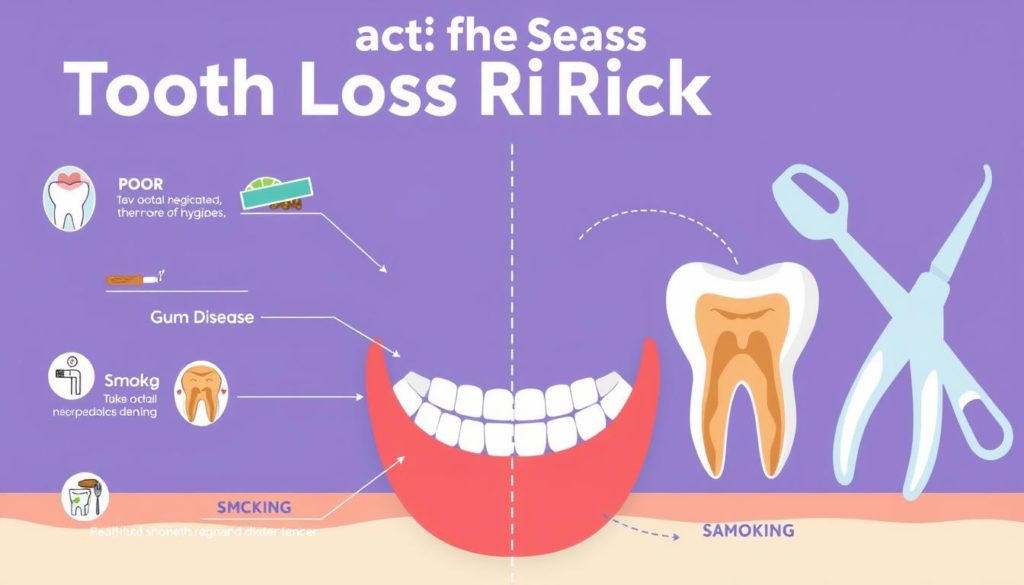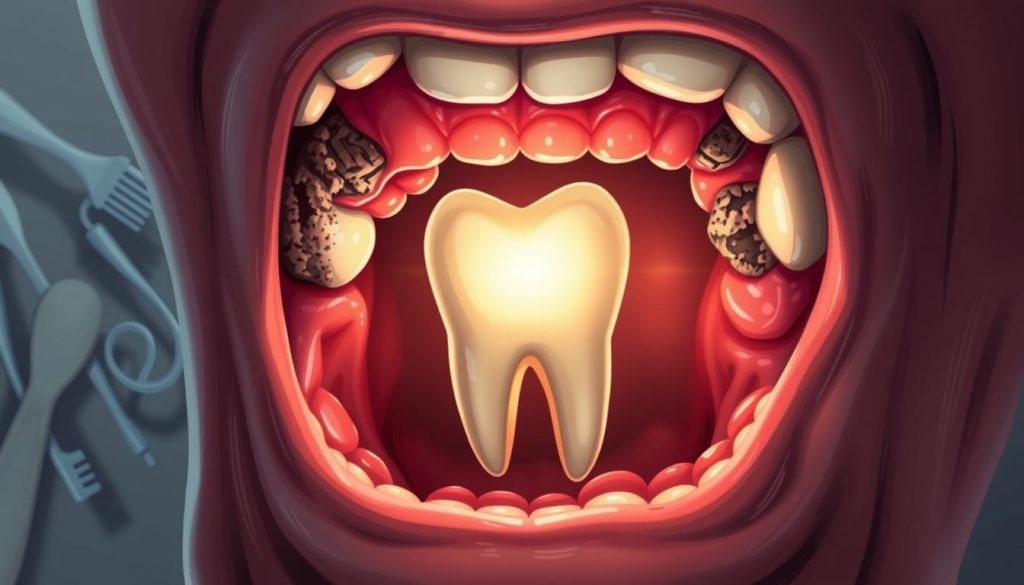Did you know that nearly 178 million Americans are missing at least one tooth? This is a shocking number. It shows how crucial dental health awareness is. Knowing the causes of tooth loss is key to preventing it and keeping your smile bright.
Understanding Tooth Loss Risk Factors
Tooth loss can come from many factors, like health problems and lifestyle choices. Knowing what increases the risk of tooth loss helps us avoid needing to pull teeth. This part will look at different things that make tooth loss more likely, from bad dental habits to diseases that harm our teeth.

Health issues like diabetes and heart disease can hurt our teeth, making them more likely to fall out. Also, choices like smoking and eating poorly can make things worse. Knowing these risks helps us make better choices for our teeth.
Key risk factors for tooth loss include:
- Poor oral hygiene
- Smoking
- Systemic health problems
- Gum disease
These factors all play a part in how healthy our teeth and gums are. By tackling these issues, we can lower the need for tooth extraction.
| Risk Factor | Description | Impact on Oral Health |
|---|---|---|
| Poor oral hygiene | Lack of regular brushing and flossing | Increases plaque buildup and tooth decay |
| Smoking | Use of tobacco products | Contributes to gum disease and tooth loss |
| Systemic health problems | Conditions like diabetes | Reduces ability to fight off infection |
| Gum disease | Inflammation of the gums | Destroys supporting tissues and bone |
The Impact of Poor Oral Hygiene on Tooth Loss
Poor oral hygiene leads to tooth loss, mainly because of dental plaque. This sticky film of bacteria causes cavities and gum disease. These issues often result in tooth decay and loss. Keeping up with a good oral health routine is essential to avoid these problems.

Daily Brushing and Flossing
Brushing and flossing every day are key parts of a good oral health routine. They remove dental plaque from teeth and between them, where cavities often start. Using fluoride toothpaste is important because it strengthens tooth enamel and fights decay.
“Brushing twice a day and flossing daily are essential habits that everyone should adopt for long-term oral health.” – Dr. Emily Lee, ADA Member
Professional Dental Cleanings
While brushing and flossing are crucial, professional dental cleanings are also vital. These cleanings remove tartar buildup that home care might miss. Regular dentist visits help catch early signs of cavities or gum disease and treat them quickly.
- Prevents dental plaque buildup
- Detects early signs of cavities
- Addresses gum disease
| Personal Care | Professional Care |
|---|---|
| Brushing | Tartar Removal |
| Flossing | Early Detection of Issues |
| Using Mouthwash | Advanced Cleaning Techniques |
It’s important to balance daily care at home with regular dental visits. This balance helps keep your smile healthy and prevents tooth loss from dental plaque and cavities.
How Gum Disease Contributes to Tooth Loss
Periodontal disease, or gum disease, is a serious issue. It can harm the structures that support your teeth and cause tooth loss if not treated. Spotting early signs and symptoms is key to avoiding worse problems.
Signs and Symptoms of Gum Disease
Knowing the signs of periodontal disease is crucial. Catching it early can greatly help. Look out for:
- Redness: Gums that stay red.
- Swelling: Gums that look puffy or swollen.
- Bleeding: Gums that bleed when you brush or floss.
- Bad Breath: A constant bad smell in your mouth.
- Recession: Gums pulling away from your teeth, making them look longer.
Preventive Measures Against Gum Disease
To stop gum disease and protect your teeth, you need to act early. A good oral care routine is essential. It should include:
- Daily Brushing: Brush your teeth at least twice a day with fluoride toothpaste.
- Flossing: Floss every day to clean between your teeth.
- Mouthwash: Use an antiseptic mouthwash to fight plaque.
- Healthy Diet: Eat a diet full of vitamins and minerals to keep your gums healthy.
- Regular Dental Visits: See your dentist regularly for check-ups and cleanings.
By sticking to a good oral care routine, you can manage and prevent gum disease. This keeps your teeth and their supporting structures healthy.
The Role of Smoking in Tooth Loss
Smoking is a major cause of tooth loss. It harms the teeth and gums badly. Knowing how tobacco affects them is key to keeping your smile healthy.
Effects of Tobacco on Oral Health
Tobacco, like cigarettes and cigars, harms the mouth. It cuts off blood flow to the gums. This can cause gum disease, a big risk for tooth loss.
Smokers also face a higher chance of oral cancer. This makes their oral health even worse.
Quitting Smoking for Better Dental Health
Stopping smoking greatly improves dental health. It helps gums, lowers oral cancer risk, and prevents tooth loss. Quitting removes harmful chemicals from your body.
This improves blood flow to the gums. It helps them heal and work better.
| Health Aspect | Before Quitting Smoking | After Quitting Smoking |
|---|---|---|
| Gum Health | Poor blood flow | Improved circulation |
| Risk of Oral Cancer | High | Decreased |
| Overall Tooth Loss Prevention | Low | Enhanced |
Genetics as a Risk Factor for Tooth Loss
Studies show that genetics can greatly affect our oral health. This means some people are more likely to face dental problems. These genetic factors are key in shaping our dental health, including the risk of losing teeth.
Inherited Dental Conditions
Genetics can lead to inherited dental issues. For instance, some may have enamel defects. These weaken teeth, making them more prone to cavities and tooth loss.
Family History of Tooth Loss
A family history of tooth loss can signal a higher risk. Knowing your dental genetics helps spot potential oral health issues. By understanding these risks, you can take steps to prevent problems. This includes good oral hygiene and regular dental visits.
Here’s how genetics can impact dental health:
| Genetic Factor | Possible Dental Outcome |
|---|---|
| Enamel Defects | Increased risk of cavities and tooth loss |
| Gum Disease Severity | Higher susceptibility to periodontal disease |
| Misaligned Teeth | Potential for tooth crowding and wear |
The Effect of Age on Tooth Loss
As we age, our bodies undergo many changes, including those in our mouths. These age-related dental changes can make losing teeth more likely. Teeth wear down over time, especially the enamel, making them more prone to cavities.
Chronic illnesses like diabetes and osteoporosis also play a role. They can make tooth loss worse in seniors. So, it’s key to focus on senior dental care to fight these risks.
Good senior dental care means regular dental visits, brushing, and flossing daily. These habits help keep teeth healthy. Regular dental checkups can catch problems early.
Here are some tips for keeping teeth healthy as you get older:
| Tips for Senior Dental Care | Benefits for Maintaining Teeth Health |
|---|---|
| Regular Dental Checkups | Early detection of problems, professional cleanings |
| Daily Brushing and Flossing | Reduces plaque buildup, prevents cavities |
| Balanced Diet | Supports overall oral and systemic health |
| Staying Hydrated | Keeps mouth moist, reduces risk of oral issues |
By tackling age-related dental changes and using the right strategies, seniors can keep their teeth healthy. This approach can reduce tooth loss and improve their quality of life.
Diabetes and Its Link to Tooth Loss
People with diabetes often face unique challenges when it comes to oral health. One of the most significant diabetic dental issues is an increased risk of periodontitis. This is a severe gum infection that can lead to tooth loss if left untreated. Managing blood sugar control is crucial in preventing these complications.
Diabetic dental issues arise due to the body’s impaired ability to fend off infections. High blood sugar levels can weaken the gums and bones that support the teeth. This makes diabetics more susceptible to periodontitis. Close attention to blood sugar control can help mitigate these risks.
Proper diabetes management includes regular dental check-ups and maintaining exceptional oral hygiene. Individuals should be particularly attentive to any signs of gum disease. Signs include bleeding gums or loose teeth, which can indicate the onset of periodontitis.
| Factors | Impact on Dental Health |
|---|---|
| Poor Blood Sugar Control | Increased risk of infections and periodontitis |
| Impaired Healing | Slower recovery from gum disease and other oral issues |
| High Blood Sugar | Damage to gums and bones supporting teeth |
How Poor Nutrition Can Lead to Tooth Loss
Nutrition is key to keeping your teeth healthy. Without the right nutrients, your teeth can suffer. A balanced diet is vital for protecting your teeth from many oral problems.
Essential Nutrients for Dental Health
Many vitamins and minerals are important for strong teeth and gums. Calcium in dairy products strengthens tooth enamel. Vitamin C in fruits like oranges keeps gums healthy and prevents gum disease.
Vitamin D helps your body use calcium better. This is important for strong teeth. But, not getting enough of these nutrients can weaken your teeth and gums, raising the risk of losing teeth.
Dietary Choices to Avoid
Some foods and drinks can harm your teeth. Too much sugar leads to cavities and tooth decay. Sugary snacks and drinks feed harmful bacteria, causing acid that weakens tooth enamel. Cutting down on sugar is key to keeping your teeth safe.
Also, avoid foods and drinks that can cause vitamin deficiency. Choose whole, nutrient-rich foods over processed ones. This can greatly help in keeping your diet balanced for good oral health.
Effective Strategies to Prevent Tooth Loss
To prevent tooth loss, start with good oral hygiene. Brush your teeth twice a day with fluoride toothpaste. Floss every day and use mouthwash to kill bacteria. These steps are key to keeping your mouth healthy.
Regular dental visits are also vital. Going to the dentist every six months helps catch problems early. They can clean your teeth better than you can at home, helping prevent tooth loss.
Eating a balanced diet is another important part of dental health. Foods with calcium and vitamin D are good for your teeth. Avoiding sugary and acidic foods also helps. By following these tips, you can keep your teeth healthy for a long time.
FAQ
What are the main causes of tooth loss?
Tooth loss can happen due to poor oral hygiene and gum disease. Smoking, genetics, age, diabetes, and bad nutrition also play a role. Drinking too much alcohol is another factor.
How does smoking affect oral health?
Smoking raises the risk of gum disease and oral cancer. This can cause tooth loss. Nicotine hurts blood flow to the gums, making these problems worse.
Can poor nutrition lead to tooth loss?
Yes, not getting enough nutrients and eating too much sugar can cause cavities. This can lead to tooth loss.
What is the impact of diabetes on dental health?
Diabetics are more likely to get periodontitis. This is because controlling blood sugar is hard. If not managed, it can cause tooth loss.
How does age affect the risk of tooth loss?
As we get older, our teeth naturally wear down. Changes in health and chronic illnesses also raise the risk. This makes dental care for seniors very important.
Are there genetic factors that contribute to tooth loss?
Yes, some people are more likely to get conditions like enamel defects and gum disease. This is because of their genes. It can weaken their teeth.
What are the signs and symptoms of gum disease?
Signs include red, swollen, and bleeding gums. If not treated, it can lead to periodontal disease and tooth loss.
Why are daily brushing and flossing important?
Brushing and flossing every day remove plaque. This helps prevent cavities and gum disease. It’s key to keeping your teeth healthy and preventing tooth loss.
What role does professional dental cleaning play in preventing tooth loss?
Professional cleanings remove plaque and tartar that brushing can miss. They help prevent cavities and gum disease.
Can quitting smoking improve dental health?
Yes, quitting smoking lowers the risk of gum disease and oral cancer. It improves dental health and reduces the chance of tooth loss.


